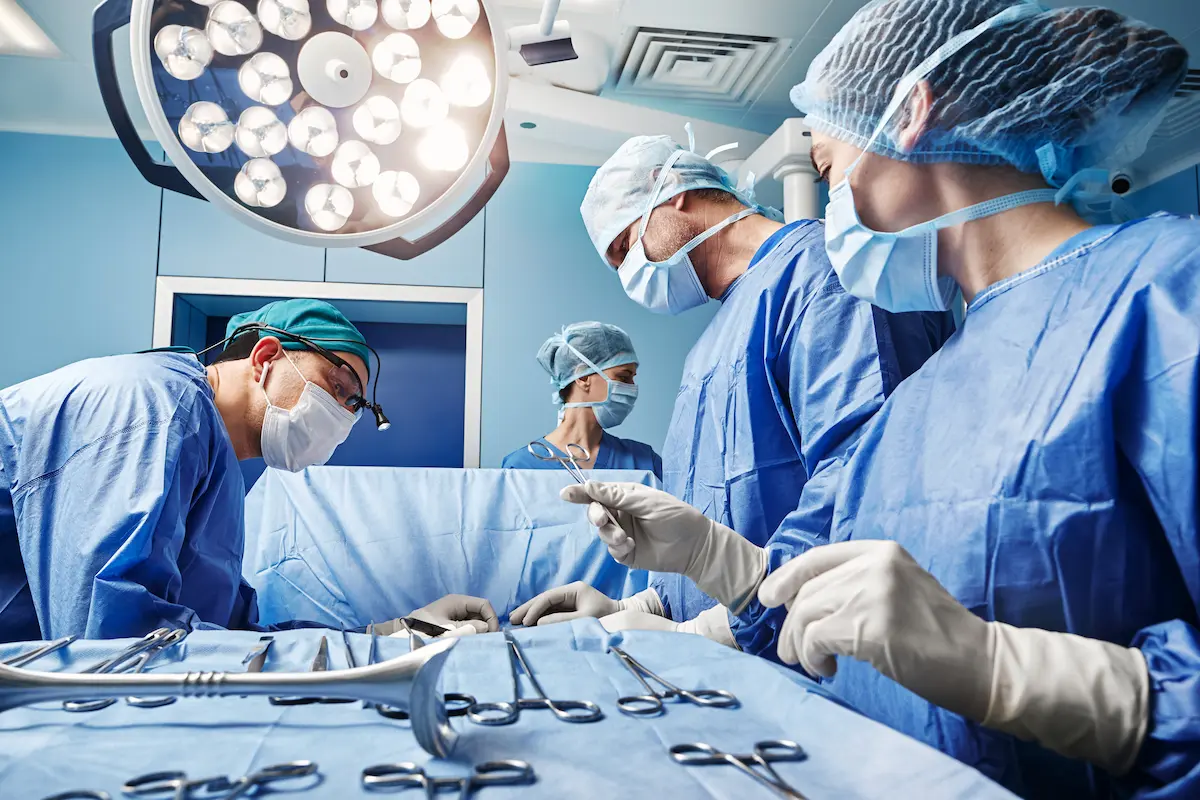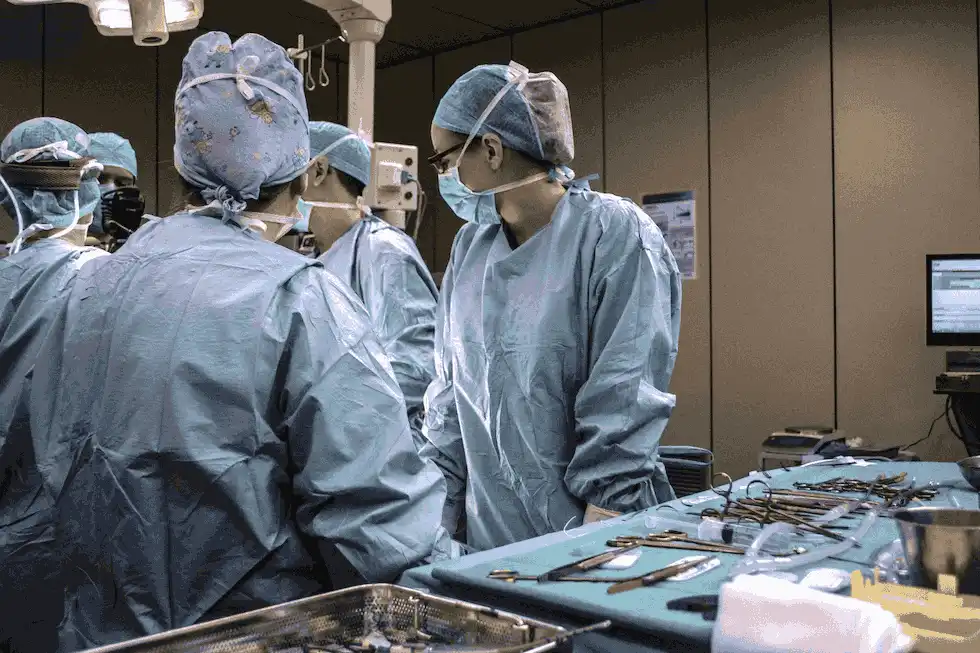There are many different routes to take in your career when working in allied health. From rehab and therapy to radiology and imaging, the options can seem endless. To learn more about the field, read our blog What is Allied Health? This blog will focus on the education requirements, skills, and other key information about surgical services in allied health.
What are surgical services?
Healthcare professionals working in surgical services assist nurses and surgeons during surgical procedures to help treat injured and ill patients. Surgical service allied healthcare professionals typically assist surgeons by handing them the necessary tools and equipment during procedures, sterilizing the medical instruments used in surgery, preparing the patients’ incision sites, and much more (John Muir Health, n.d.). These allied health workers play a vital role in surgical procedures. Keep reading to learn more about the job details for anesthesia techs, cardiovascular operating room techs, certified surgical techs/operating room techs, sterile processing techs, and surgical first assistants.
Anesthesia tech
The main role of an anesthesia tech is to assist the anesthesiologist by managing, cleaning, sterilizing, and testing the equipment that is used for medical procedures (Cleveland Clinic, n.d.). Anesthesia techs also assist the anesthesiologist by monitoring the patient when they are unconscious for a procedure. These healthcare professionals work to ensure the patient is as comfortable as possible when undergoing different forms of surgery.
Education requirements
While some healthcare facilities may require an anesthesia tech to complete an associate's degree in a healthcare related field, some employers require only a completion of a GED or high school diploma for entry-level positions (Cleveland Clinic, n.d.). According to an article, “The American Society of Anesthesia Technologists and Technicians (ASATT) also administers an examination that certifies anesthesia technicians to work in hospitals,” (Cleveland Clinic, n.d.).
Skills
Common skills necessary for this line of work include patient care, clear communication, anesthesia drug knowledge, CPR, attention to detail, and more. Anesthesia techs will also need to be extremely familiar with anesthesia machines and delivery systems.
Cardiovascular operating room tech
A cardiovascular operating room technologist, or CVOR tech, is responsible for sterilizing and equipping the operating room for cardiovascular procedures. These healthcare professionals assist the surgical team by providing patient care and supplying the necessary instruments needed for procedures (Vivian, n.d.).
Education requirements
If you’re interested in becoming a cardiovascular operating room technologist, you will need to obtain a high school diploma or GED, as well as complete an accredited cardiovascular technology program that usually takes one to two years to complete (Vivian, n.d.). Depending on the state in which you practice, you may need additional credentials, such as the certified surgical technologist (CST) credential.
Skills
To be a successful cardiovascular operating room tech, you’ll need to be skilled in critical thinking, active listening, empathy, human anatomy, and more.
Certified surgical tech/operating room tech
Many people do not realize this, but certified surgical techs and operating room techs are actually the same role. These allied health professionals play an important role before, during, and after surgical procedures. Surgical techs/operating room techs are responsible for prepping the operating room and the patients for surgery (DerSarkissian, 2023).
Education requirements
Similar to all the other allied health careers listed above, you’ll need to earn a high school diploma or GED. Once that is complete, you’ll have to obtain a certificate, diploma, or associate’s degree from an accredited surgical technology program, followed by the completion of clinicals (DerSarkissian, 2023).
Skills
Necessary skills required for this career consist of strong communication skills, the ability to effectively collaborate, adequate physical stamina, an empathetic personality, and more.
Sterile processing tech
Also known as central service (CS) technicians, sterile processing techs ensure patients do not contract any infections during the surgical process. To prohibit any infections, these medical professionals’ duties are to clean, sterilize, store, assemble, and distribute the medical instruments and equipment used for surgery (Mayo Clinic College of Medicine and Science, n.d.).
Education requirements
First, you will need a high school diploma or GED to become a sterile processing technician. Next, you’ll want to complete a sterile processing technician program. The length of these programs can range from a little over two months to two years depending on which one you choose to complete. Some programs require completion and a passing score for an entrance exam. It is beneficial and, in some cases, necessary to seek out an internship after you’ve completed a sterile processing technician program so you can gain hands on experience. To become certified as a sterile processing technician, you must complete a certain number of hours of working experience. Once you’ve completed the necessary hours of work experience, you can either take the exam through the International Association of Healthcare Central Service Materiel Management (IAHCSMM) or the Certification Board for Sterile Processing and Distribution (CBSPD) (Indeed Editorial Team, 2023).
Skills
To be an efficient sterile processing technician, you’ll want to be diligent in your work, detail oriented, communicative, and knowledgeable in sterilization procedures and basic medical terminology.
Surgical first assistant
These healthcare professionals directly assist surgeons during medical procedures to help with the success of patients’ surgeries and recovery. According to an article, “They are advanced allied health practitioners who provide aid in exposure, wound closure, bleeding control, and other intraoperative technical functions that help the surgeon carry out a safe operation with optimal results for the surgical patient” (Mayo Clinic College of Medicine and Science, n.d.).
Education requirements
Before you can become a surgical first assistant, you need all the education requirements of a surgical tech and have several years of experience in the field. Once you’ve met these requirements, you must complete an accredited surgical first assistant program. After this step is completed, you’ll then need to pass the certified surgical first assistant (CSFA) exam, which is administered by the National Board of Surgical Technology and Surgical Assisting (NBSTSA) (Mayo Clinic College of Medicine and Science, n.d.).
Skills
A few key skills you will need for this profession include wound dressings, critical thinking, strong communication, patient care, and catheter insertion.
With so many allied health job opportunities to choose from, it can be hard to determine which career is best for you. We hope this blog gave you a better idea of all the allied health surgical service professions and what they entail. Search all of Favorite’s allied health jobs today!
Sources
https://www.vivian.com/explore/allied-health/cvor-tech/
https://www.webmd.com/a-to-z-guides/what-is-surgical-technologist
https://www.indeed.com/career-advice/finding-a-job/how-to-become-sterile-processing-technician





